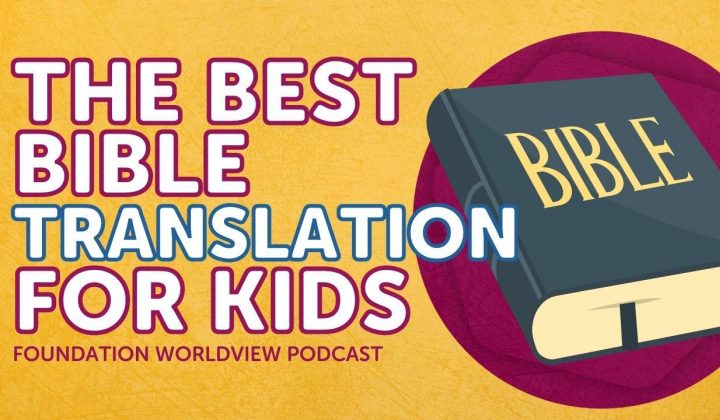Learn more about the journey that led to us equipping kids to carefully evaluate every idea they encounter.
Meet members of our team who have contributed to curriculum development.
Hear from real users of the Foundation Curriculum.
Learn what we believe about God, Jesus, Scripture, and more.
Explaining Scripture to Kids
Today's question says, "John 15:14 says, we are Jesus's friends if we do what he commands, since that's not how human friendships work, that we're only friends if you do everything I say, how do I explain this to my child?"
Transcript
Note: The following is an auto-transcript of the podcast recording.
Hello friends and welcome to another episode of the Foundation Worldview podcast where we seek to answer your questions so that you can equip the children that God has placed in your care to carefully evaluate every idea they encounter and understand the truth of the biblical worldview. I'm your host, Elizabeth Urbanowicz and I'm thrilled that you joined me for another episode today. Today's question says, "John 15:14 says, we are Jesus's friends if we do what his commands. Since that's not how human friendships work, that we're only friends if you do everything I say, how do I explain this to my child?" Interesting question, and I love questions like this where we're thinking, okay, how do we explain different concepts in Scripture to our kids because we as Christian parents should be thinking through these questions.
Before we dive down deep into answering that question today, I would just ask again that you take the few seconds that it takes to rate this podcast. Doing so just really helps push this content out to more individuals so we can equip as many Christian parents as possible to get their kids to carefully evaluate the ideas they encounter. Also, ask that if you have a question that you would like for me to answer on a future Foundation Worldview podcast, you can go and submit that by going to FoundationWorldview.com/podcast.
Okay. Now, as we think through this question, Jesus saying, we are his friends, if we do what he commands, how do we explain this to our kids? I think there's two key concepts that we need to cover here. The first concept that we need to cover with our kids is that God is completely different than us. God is completely different than us. He is God and we are not. He's the creator. We are the creature. So we need to help our kids understand that God is different than us. The second key concept here is that we must train our kids to read Bible verses in context because anytime we're pulling out just a single isolated verse and trying to understand it, we're probably not going to understand it correctly without the surrounding context. So these two key principles that God is completely different than us, and we must read Bible verses in context. We're going to look at these two principles and then filter John 15, verse 14 through the lens of this.
Now, it's really important for our kids to understand this concept of God being different than us, especially as we're thinking of this concept of John 15:14 because this verse, it's not talking about friendship in general. Jesus isn't saying, here's how you are friends with one another. When others obey what you say, that's not what Jesus is talking about. It's talking about those who are considered the friends of God because Jesus is God the Son. So how are we considered friends of God? Well, when we obey his commands. And that is because God is God and we are not. Now for those of you who have taken the children in your care through Foundation's Attributes of God curriculum, you know that we have an entire unit in that curriculum that covers God's incommunicable attributes, and God's incommunicable attributes are the attributes that he alone possesses. And the purpose of having this unit in our Attributes of God curriculum is to help kids grasp how God is so much greater than we are, because we as fallen humans will naturally view God through the lens of ourselves and how we respond to things. And this is how our children are going to view God as well. That we just view, okay, how do I love someone? How do I speak to someone? How do I do good for someone else? And then we view God through that lens where it should be just the opposite. We need a correct understanding of who God is, and then we take that correct understanding and say, okay, so therefore how should I live in response to this? So we need to intentionally teach our children's God's attributes so that they understand how much greater he is than we are and how he is worthy of our worship of all our praise. And so when our kids understand that God is God and we are not, then we can talk to them and say our relationship with God is going to look different than all other human relationships.
And a great analogy is the analogy of a parent-child relationship. You can say to your child, your relationship with me looks different than your relationship with anyone else. And then talk through how is that relationship different? Well, there's no one who loves you, who loves your child as much as you do. So you can say there's no one who loves you as much as I do. There's no other human except for, you know, your mom and dad are present. There's no one who loves you more than your dad and I do than your mom and I do. No other human who does. God is the one caveat. God does love them more than we ever could, but we can talk about how that relationship is different and then say, is there anybody else who you just immediately obey? No. When you're in school, yes, you have to obey your teacher. When you're in your Sunday school class, again, you obey your teacher, but no other adult can walk into your house and just suddenly start commanding your children and say, if our neighbor came into our house and told you to do something, you wouldn't just automatically obey her because she's not your mom. When your friend tells you to do something, you don't just automatically obey your friend because your friend is not your parent. Okay?
So you talk through these things and then say it's similar with our relationship with God. Our relationship with God is going to look different than any human relationship that we have because God is God and we are not. So that's the first thing that we need to help our kids understand that God is completely different than us.
The second thing that we must do is we must help 'em understand that we have to read Bible verses in context, okay? We have to read Bible verses in context to understand the full context. If you have taken the children in your care through our Studying the Bible Curriculum at Foundation Worldview, that is one of the big truths we cover in unit two that we must read Bible verses in context.
So when we're looking at this passage, when we're looking at John 15, verse 14, what is the full context of Jesus's words here? Well, John chapter 15 is part of the upper room discourse, which covers, it spans multiple chapters in John. So what we're going to do now is we're going to read John chapter 15 verses one through 17. So 14 is sandwiched right in the middle there. So John chapter 15 verses 1 through 17, Jesus is speaking and he says, "I am the true vine, and my Father is the gardener. He cuts off every branch in me that bears no fruit, while every branch that does bear fruit he prunes so that it will be even more fruitful. You are already clean because of the word I have spoken to you. Remain in me, as I also remain in you. No branch can bear fruit by itself; it must remain in the vine. Neither can you bear fruit unless you remain in me. I am the vine; you are the branches. If you remain in me and I in you, you will bear much fruit; apart from me you can do nothing. If you do not remain in me, you are like a branch that is thrown away and withers; such branches are picked up, thrown into the fire and burned. If you remain in me and my words remain in you, ask whatever you wish, and it will be done for you. This is to my Father's glory, that you bear much fruit, showing yourself to be my disciples. As the Father has loved me, so have I loved you. Now remain in my love. If you keep my commands, you will remain in my love, just as I have kept my Father's commands and remain in his love. I have told you this so that my joy may be in you and that your joy may be complete. My command is this: Love each other as I have loved you. Greater love has no one than this: to lay down one's life for one's friends. You are my friends if you do what I command. I no longer call you servants, because a servant does not know his master's business. Instead, I have called you friends, for everything that I learned from my Father I have made known to you. You did not choose me, but I chose you and appointed you so that you might go and bear fruit - fruit that will last - and so that whatever you ask in my name the Father will give you. This is my command: Love each other."
So then we can ask ourselves and our kids, what does the context reveal about this verse? Well, when we look at those first 17 verses of John chapter 15, we see that Jesus first commands his disciples to abide in him. Then he explains that abiding in him means that they will love one another. That loving one another is the proof that they're abiding in him. So then the evidence that they're abiding in Jesus that they love him is obedience to his commands. Okay, I'll say that again. So Jesus is commanding his disciples to abide in him. Then he explains that abiding in him means they will love one another, and the evidence that they are abiding in Jesus that they love him is obedience to his commands. So we prove that we have a reconciled relationship to God, that we are his friends by our obedience to him. So that's what the fuller context of this passage is teaching, that our obedience to his commands is proof that we have been reconciled to him, that we are his friend.
So it's not that we obey Jesus now and we're friends with him now and then two hours later we disobey him and we're not friends with him. No, that our continual obedience, not our perfect obedience, but our continual obedience, and then when we make mistakes, when we sin against him, our repentance being obedient in repentance is the proof that we are abiding in him, that we are his friends, we are truly his disciples. And so our friendship with humans is different than our friendship with God. We do not prove that we love our friends through obeying them. We prove that we love them through caring for them, through doing what is best for them.
And so an easy way to discuss this with our children is then to bring up again the analogy of parenthood, that they show their love for you by obeying you, that when they obey you, they are showing that they truly love you, but you don't demonstrate your love to them in that way.
I was just thinking about, as I was writing notes for this podcast, one of my nieces, one day my mom called my sister and my niece was there and my niece had obviously been crying. My mom was FaceTiming with her and my mom said, oh sweetie, what's wrong? What happened? And her little 2-year-old voice, she said, mommy disobeyed me. And so my mom and sister just began to crack up, and then my sister had to explain that Mommy can't disobey you because you're not in authority over mommy. You can disobey mommy, because mommy's in authority over you, but what you mean is mommy didn't do what you wanted her to do. And so you can talk about this with your kids, that you demonstrate your love for them by doing what is best for them, where they demonstrate their love for you by obedience, because that is the parent-child relationship. You are the parent, they are the child. And so it's the same or similar with us and God, that we demonstrate our love for God through our obedience to his commands. And that love is the proof that we have a reconciled relationship with God.
So I hope that just kind of walking through those two key things, one that we need to help our kids understand that God is completely different than us and that we need to read Bible verses in context. I hope that it was helpful for answering this specific question about how do we explain John 15 verse 14 to our children, but also, I hope that this is just a paradigm that we all can take with any difficult question that we have about Scripture and helping our kids understand, okay, how do we see in this passage that God is completely different than us? And then what truths are revealed as we read this verse in context. Again, if you haven't checked out yet, our Attributes of God curriculum or our Studying the Bible Curriculum, those are our first two curriculums in our Biblical Literacy track here at Foundation Worldview. And when you go through those curriculums, the things that I just walked you through are going to come so naturally to your children and to you as you go through those materials together. So highly recommend that you head over to the Foundation Worldview website and check out those curriculums.
Well, that's a wrap for this episode. But as always, my prayer for you as we leave this time together is that no matter the situation in which you and the children God has placed in your care, find yourselves that you would trust that God is working all things together for your good. By using all things to conform you more into the image of His Son. I'll see you next time.
Related Posts and insights

How to Study the Bible for Kids and Parents - A Starter’s Guide for Home Discipleship
We need to teach our kids how to fish so they can read, interpret and apply the Bible for themselves.

Apologetics For Kids - A True Wake Up Call!
Looking for great resources for apologetics for kids from elementary school and on? Start here! Short guide with recommended books and practical advice.

Are There Better Bible Translations for Kids?
There are many different Bible translations available, but which one is the best for kids? And how can you help prepare them to read and study the Bible on their own? This episode will answer those questions and more, giving you the tools you need to help your kids grow in their faith.





